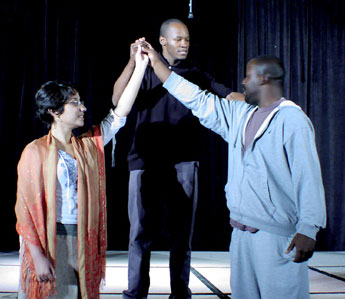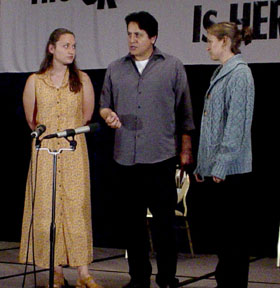
Home | Search | About | Fidelio | Economy | Strategy | Justice | Conferences | Links
LaRouche | Music | Join | Books | Concerts | Highlights | Education | Health
Spanish Pages | Poetry | Dialogue of Cultures | Maps
What’s New
 |
||||
| EIRNS/Gene Schenk Schiller Institute Presidents’ Day Conference West Coast LaRouche Youth Movement performance of Shakespeare’s ‘Julius Caesar.’ |
||||
LaRouche Youth Movement
Brings Shakespeare’s ‘Julius Caesar’
to Life
by Paul Gallagher
Related Pages
LYM Brings Shakespeare’s ‘Julius Caesar’ To Life
by Paul Gallagher
 |
||||
| ©EIRNS/Sylvia Spaniolo Actor Robert Beltran conducts Schiller Institute conference west coast drama workshop. |
||||
The LYM’s confident performance “delivered,” and generated inspiration and enthusiasm for the expansion of this quality of work throughout the movement.
A striking feature of this presentation of “Julius Caesar,” was that the two Acts were an integrated whole, which seemed almost to be a single, rapidly moving scene, with one unifying conception throughout, established in the opening seconds of performance, without benefit of program or pre-discussion. The Roman commoners’ opening was masterfully done, not as “comic prelude”—although full of jokes—but as a powerful driver of the tense energy of the entire two Acts. The raucus commoners chanting Caesar’s name at the start, then, apparently cowed and dispersed with great difficulty by the Tribunes Flavius and Marullus, immediately reappeared, chanting “Caesar!” again, as the Tribunes left the stage and Caesar approached it.
So, the menacing foreshadow of the approaching, chaotic doom of the Roman republic was immediately thrust in the face of the leading, “noble” characters. And by the “attack” chosen by Beltran and the LYM actors, this foreboding sense of menacing doom was maintained and intensified throughout. It put into sharp relief the nobility’s competing, fatal efforts to base dictatorship upon “popularity” with an irrational mob.
Several of the actors showed an ability to use silent suspensions to increase the sense of Nemesis—as for example, when Caesar, with the distraught Soothsayer prostrate at his feet after delivering the “Ides of March” warning, held the stage and the audience frozen in a long, nervous suspension of dread before suddenly declaring “He is a dreamer!” snapping the tension on stage, but increasing it in the minds of the spectators.
When the two Acts were done, we were left with a strong desire to see them go on to the extraordinary Act III!
Principles of Classical Drama
Harley Schlanger, the West Coast coordinator of the LaRouche political movement, opened the following discussion by noting that this performance was the fruit of a nearly year-long dialogue on the principles of Classical drama, among Lyndon LaRouche, Robert Beltran, and the LYM. This took place, in part through direct discussions, and more through the extraordinary treatment of Shakespeare’s drama in many of LaRouche’s writings and speeches over that year. Robert added, that after their several years’ work on Shakespeare and Friedrich Schiller, it had been the LYM’s idea to prepare Acts I-II of “Julius Caesar” for performance, and that they had done the casting. Cody Jones and Elodie Viennot had been his actor/co-directors.
We could accomplish a great deal by the development of the potential for a Classical acting company, Beltran emphasized. We know, for example, the real content of these two acts of Shakespeare, “as well or better than anyone on the planet.” And he noted that all the LYM groups he’d worked with possessed great acting potential, and were far more representative of the society than the “all-Kansans” companies dominating what passes for (the occasional) Classical stage performance now.
Cody Jones (Flavius) opened the actors’ dialogue, pointing out that both LaRouche and Schiller, raise the question of how to marry your emotions to reason with the drama. He said that he used the thought-object of Leibniz’s conception of the calculus. You have a principle of universal history. The integral, or “whole curve” of that principle is the drama; the individual characters and moments of the play are the “differentials” of this One. So, your mind has to be in two places at once on the stage. You must do emotional work on yourself, to do this.
Elodie Viennot (the Cobbler) asked, “Why do we work on drama?” First, she said, because of what we must do in order to act. You have to understand the audience—you are doing it for them, not for yourself (not like “the little teapot” showing off its attributes, as she put it—“when the tea is ready, I will shout,” etc.). You're looking for a principle that is unseen, which governs what they see. Understanding the audience, means understanding which principles in the culture are taking it down to doom. And further, you, yourself, must be engaged in fighting against that doom. Then, you have to know the playwright’s mind. This takes a common effort by the cast and the director.
Viennot reported that she had recently seen Shakespeare’s “Romeo and Juliet” performed, which, as with “Caesar,” shows how society fails for specific reasons, sometimes historically universal with our own, sometimes specifically different. On the stage, you see people who represent hope, and they fail. This makes an appeal to you within your heart (and to those who survive the tragedy on the stage).
Viennot mentioned that she is about to return to France, and that there, the LYM will begin work on Shakespeare, in English.
Drama and Bel Canto
The first question to the company came from John Sigerson in Virginia, who asked whether the actors, in their effort to portray their characters’ passions, passionately, had not at times gone beyond the range of bel canto control of their speaking voices, to a level of real harshness. This was affirmed by Robert Beltran, but he partly explained and partly demonstrated his idea that there is a difference between dissonance in Classical music, and in drama. There are among the characters some who must be passionately portrayed as dissonant, human beings who are not beautiful, are not resolved, but are ugly—or anguished. “There’s no beauty to a sobbing figure,” or a shrieking character, he said, but their ugliness may be necessary to the dramatist. (This issue was discussed at length by Gotthold Lessing in his aesthetical work, “Laocoon.”) Beltran demonstrated how an actor may need to use, in rapid succession, tones which are 4-5 octaves apart, beyond the possibility of a range under bel canto control. But he appreciated the importance of the point raised by Sigerson, of the training for that control, and referred back to it several times in the following discussion.
LYM member Karon Concha, organizing in the Midwest, asked about how to achieve the unity of motion and speech on the stage. Beltran answered that this comes from training; in particular, training of breathing is important, because the freedom of breath of the vocal apparatus is key to the freedom of all kinds of motion on the stage.
Tina Rank, a LYM member from Dresden, Germany, asked about the difference between working on Schiller and Shakespeare. Beltran’s answer was that he approached both from a common mission: to locate the long and truthful arc of the poet’s thought in each moment of his play. He said he does not make a judgment between them in the effectiveness of our drama work, except to note that actors and director have to be aware of the characteristic of the translation that they use (Schiller wrote in the German language).
Kenny Stallings, also in the Midwest, asked how this inspiration could be used to launch effective drama work there, where, he said, the collapse of any real culture is really hurting the people’s souls. Cody Jones responded, discussing how these dramas enable us to show people the beauty of Classical ideas, and open the door to Classical culture for them.
Rianna St. Classis of Seattle stated rather emphatically that she had “always hated this play” (“Caesar”); she had worked on a high school performance of it, and again since, and “really hates it.” And she thanked the company for “the first time I've ever seen it brought to life”!
In response to several other questions and observations on how to make this Classical artistic work effective, Tim Vance (Casca) intervened with passionate emphasis on giving yourself over to working with masters. He noted that he had joined the LaRouche movement and the Los Angeles LYM drama workshop at about the same time; just as you have to go with Lyn with your full heart, he said—“When he moves, be there with him!”—so, the same applies when you can work with someone as masterful as Robert Beltran as a director, or John Sigerson as a chorus director and conductor—“Be there, work with him,” Vance said.
The Idea of a Republic
Schlanger noted that LaRouche, in one of his many breakthrough insights into Shakespeare’s art, had brought up the importance of Cicero in “Julius Caesar.” This reflects the question of how Shakespeare gives his audiences the idea of a republic. This is the real historical process, as seen by a genius.
A question came from the LYM in Mexico, participating over the Internet, essentially: “How do we do this work without a director?” Schlanger reminded them that Robert Beltran had been recruited—by LaRouche’s writings, by his extensive reading of Fidelio, by discussions; and they might recruit someone of talent there. Beltran agreed that if they were to approach Classical actors, they would probably agree—actors have a concern for other actors—but that they would also have to be taught by us. And he said that he would be happy to visit them in Mexico.
Ed Hamler, in Boston, asked, “How can you figure out whether what you're doing is natural?” The question was taken by Montez Baker (Caesar), who described his own up-and-down struggle with his character, “to get into the mind of Shakespeare.” This requires that you use your emotions to keep your mind focussed on the meaning of what you say and do, not to routinize it; and also, that you keep thinking about the meaning of the speeches of the other characters—not falling into listening to them for cues to your own performance. Montez’s response on “naturalness” brought the actors’ discussion back to the way it had begun, when Cody Jones emphasized that “your mind has to be in two places at once” on the stage; and Elodie’s point about knowing the mind of the audience, and that of the playwright, and training your own mind as an actor.
What is the Schiller Institute?
William Shakespeare and Thomas More: The Conscience of Kings
Reflections On Shakespeare as a Historian: The Roman Plays
An Evening in the ‘Simultaneity of Eternity’ with Shakespeare, Keats, and William Warfield
John Keats Vs.The Enlightenment
Drama as History Clifford Odets’ The Big Knife and Trumanism
Writings of Other Great Thinkers
Biography of Friedrich Schiller
![]()
schiller@schillerinstitute.org
The Schiller Institute
PO BOX 20244
Washington, DC 20041-0244
703-771-8390
Thank you for supporting the Schiller Institute. Your membership and contributions enable us to publish FIDELIO Magazine, and to sponsor concerts, conferences, and other activities which represent critical interventions into the policy making and cultural life of the nation and the world.
Contributions and memberships are not tax-deductible.
VISIT THESE OTHER PAGES:
Home | Search | About | Fidelio | Economy | Strategy | Justice | Conferences | Links
LaRouche | Music | Join | Books | Concerts | Highlights | Education | Health
Spanish Pages | Poetry | Dialogue of Cultures | Maps
../../whats_new/what's_new.html
© Copyright Schiller Institute, Inc. 2005. All Rights Reserved.